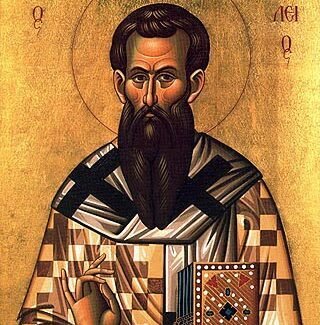Contenus
ToggleIn short
Basil of Caesarea, also called Basil the Great (he received this nickname during his lifetime), born in 329 and died, according to tradition, on à Césarée de Cappadoce, est l’un des principaux Pères de l’Église.

Saint Basil of Caesarea, father of the Church
Fondateur d’un monastère dans la région du Pont, sur la mer Noire, il est l’auteur d’une règle connue comme la règle de saint Basile. Celle-ci est devenue la principale règle monastique de l’Église d’Orient et a partiellement inspiré la règle de saint Benoît dans l’Occident chrétien. Il pratiqua l’ascèse toute sa vie.
The rule of Saint Basil was divided into two parts: the “major rules” and the minor rules. They were unified by their Latin translator, Rufinus of Aquileia, under the title of Regulae sancti Basilii episcopi Cappadociae ad monachos. This rule was adopted by several monasteries in the West.
In his rule Basil adopts a simple catechetical method. The disciple asks a question to the master who answers it. It limits itself to the fundamental principles of monastic life which will guide the superiors of monasteries in the direction of their monks.
The questions generally concern virtus that monks must practice and the vices to avoid. Basil often refers his monks to Holy Scripture. In his eyes, the Bible is the source of all monastic legislation; it is the only and true rule. Many answers contain a biblical quotation of several verses followed by a commentary which defines the meaning. Poverty, obedience, renunciation and personal abnegation are the foundation of all monastic life.
Basil's rule is remarkable for its human and religious prudence and wisdom. It leaves to the local superior the task of regulating and legislating on the organization of daily life. It does not enter into the temporal administration of monasteries.
Over time, the rule was enriched by a monastic tradition, including the decisions of councils, instructions from particularly revered abbots, and imperial ordinances from Constantinople. This created a whole body of monastic legislation around the rule, more or less accepted and observed in Eastern monasteries, depending on the regions where they are located. But the existence of the rule of Saint Basil remains the unifying principle.
En 370, il devient évêque de Césarée. Son engagement pendant la famine, les institutions qu’il crée et qui porte son nom (la Basiliade) en ont fait l’un des précurseurs du christianisme social.
Il défend la foi de Nicée contre l’arianisme et écrit des traités sur le Saint-Esprit, développant la théologie de la Trinité. Il cherche autant que possible à limiter les divisions au sein de l’Église. Il est considéré avec son frère Grégoire de Nysse et Grégoire de Nazianze comme l’un des trois «Pères cappadociens».
Saint Basile de Césarée est reconnu comme Docteur de l’Église en 1568 par le pape Pie V. Il est vénéré en tant que saint par les orthodoxes comme par les catholiques : il est fêté le 2 janvier en Occident, et le 1er janvier, son dies natalis, en Orient, mais également lors de la «fête des trois docteurs œcuméniques», le 31 janvier, avec Jean Chrysostome et Grégoire de Nazianze.
Basil is recognized as one of the great theologians of the 4th century, he published a book on the Holy Spirit written in 375, the treatise Against Eunomius in three books written between 363 and 365, thirty-seven homilies, including nine on the work of the six days called the Hexameron or the six days of creation, which Ambrose of Milan imitated, thirteen homilies on psalms, as well as a rich epistolary correspondence. He also left treatises on Morality and Asceticism and Commentaries on various parts of Scripture.
He also produced several other literary works in a style similar to that of the Second Sophistic, such as Lucian of Samosata.
Social networks
Today, Catholics celebrate Saint Basil of Caesarea. A theologian of the Trinity, he is at the origin of the rule of Saint Basil. In his rule Basil adopts a simple catechetical method. The disciple asks a question to the master who answers it. It limits itself to the fundamental principles of monastic life which will guide the superiors of monasteries in the direction of their monks. #calendar #2January #mythology #myth #legend #Christianity #Catholicism #jesus #basile
Picture
